|
You can only work on, with and toward the things on your active mental radar
A change in the human condition begins
A Century of Social Transformation is the main feature, but a very quick glance and scroll through some of Peter Drucker’s other work will provide a broader and better foundation / brainscape or thoughtscape / timescape. The images above form a timescape — from pyramids to DNA (a world organized by information)
 A Functioning Society A Functioning Society
 The Ecological Vision The Ecological Vision
 The End of Economic Man (it’s probably in the news today) The End of Economic Man (it’s probably in the news today)
The first of three books that sketched a foundation for the world that emerged after World War II. The other books are The Future of Industrial Man (1942) and Concept of the Corporation — a society of organizations
Chapter 2, Drucker’s Vision of the New World in Drucker: The Man Who Invented the Corporate Society
 Management, Revised Edition (a long, partial view of the management thoughtscape) Management, Revised Edition (a long, partial view of the management thoughtscape)
Indeed, the typical picture of what goes on in the “front office” or on “the fourteenth floor” in the minds of otherwise sane, well-informed and intelligent employees (including, often, people themselves in responsible managerial and specialist positions) bears striking resemblance to the medieval geographer’s picture of Africa as the stamping ground of the one-eyed ogre, the two-headed pygmy, the immortal phoenix and the elusive unicorn.
 Peter Drucker called himself social / political ecologist — concerned with man’s man-made environment the way the natural ecologist studies the biological environment. Peter Drucker called himself social / political ecologist — concerned with man’s man-made environment the way the natural ecologist studies the biological environment.
… And now to the main feature:
A Century of Social Transformation —
Emergence of Knowledge Society
A fundamental change in the human condition

More background info
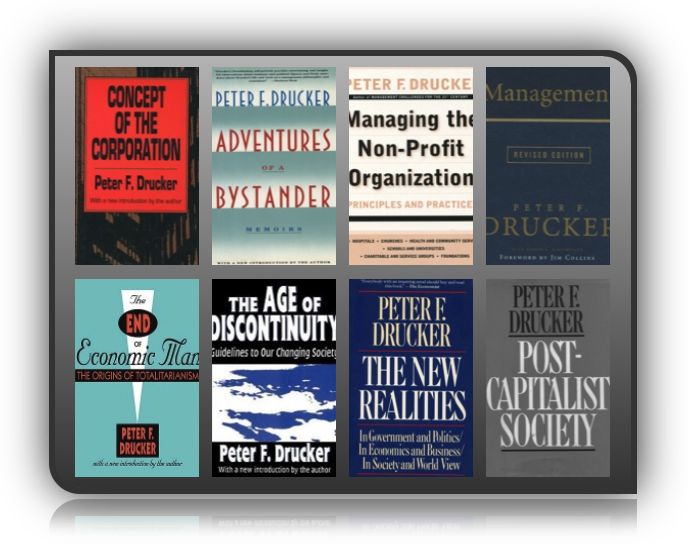
Outline of his books

An individual’s “work life”
bread-crumb trail
… “They [individuals] can no longer assume that what they have learned as children and youngsters will be the “foundation” for the rest of their lives.
It will be the “launching pad” — the place to take off from rather than the place to build on and to rest on.
They [individuals] can no longer assume that they “enter upon a career” which then proceeds along a pre-determined, well-mapped and well-lighted “career path” to a known destination — what the American military calls “progressing in grade.”
The assumption from now on has to be that individuals on their own will have to find, determine, and develop a number of “careers” during their working lives.
Try exploding “find, determine, and develop” using
thinking broad and thinking detailed along with
information is not enough
Thinking canvases may prove helpful
And the more highly schooled the individuals, the more entrepreneurial their careers and the more demanding their learning challenges” more
Consider the production hierarchy that guides a movie making project, who do they want involved? Will they employ people they don’t trust?
Managing oneself
a revolution in human affairs
The changes and challenges of Managing Oneself may seem obvious, if not elementary, compared to the changes and challenges discussed in the earlier chapters.
And the answers may seem to be self-evident to the point of appearing naïve.
To be sure, many topics in the earlier chapters—for example, Being a Change Leader or some of the Information Challenges—are far more complex and require more advanced and more difficult policies, technologies, methodologies.
But most of the new behavior—the new policies, technologies, methodologies—called for in these earlier chapters can be considered EVOLUTIONS.
Managing Oneself is a REVOLUTION in human affairs.
It requires new and unprecedented things from the individual, and especially from the knowledge worker.
For in effect it demands that each knowledge worker THINK and BEHAVE as a Chief Executive Officer.
It also requires an almost 180-degree change in the knowledge workers’ thoughts and actions from what most of us—even of the younger generation—still take for granted as the way to think and the way to act.
Knowledge workers, after all, first came into being in any substantial numbers a generation ago.
(I coined the term “knowledge worker,” but only thirty years ago, in my 1969 book The Age of Discontinuity.)
But also the shift from manual workers who do as they are being told—either by the task or by the boss to knowledge workers who have to manage themselves profoundly challenges social structure.
For every existing society, even the most “individualist” one, takes two things for granted, if only subconsciously: Organizations outlive workers, and most people stay put.
Managing Oneself is based on the very opposite realities: Workers are likely to outlive organizations, and the knowledge worker has mobility.
In the United States MOBILITY is accepted.
But even in the United States, workers outliving organizations—and with it the need to be prepared for a Second and Different Half of One’s Life—is a revolution for which practically no one is prepared.
Nor is any existing institution, for example, the present retirement system.
In the rest of the developed world, however, immobility is expected and accepted.
It is “stability.”
In Germany, for instance, mobility—until very recently came to an end with the individual’s reaching age ten or, at the latest, age sixteen.
If a child did not enter Gymnasium at age ten, he or she had lost any chance ever to go to the university.
And the apprenticeship that the great majority who did not go to the Gymnasium entered at age fifteen or sixteen as a mechanic, a bank clerk, a cook—irrevocably and irreversibly—decided what work the person was going to do the rest of his or her life.
Moving from the occupation of one’s apprenticeship into another occupation was simply not done even when not actually forbidden.
The developed society that faces the greatest challenge and will have to make the most difficult changes is the society that has been most successful in the last fifty years: Japan.
Japan’s success and there is no precedent for it in history—very largely rested on organized immobility—the immobility of “lifetime employment.”
In lifetime employment it is the organization that manages the individual.
And it does so, of course, on the assumption that the individual has no choice.
The individual is being managed.
I very much hope that Japan will find a solution that preserves the social stability, the community—and the social harmony that lifetime employment provided, and yet creates the mobility that knowledge work and knowledge workers must have.
Far more is at stake than Japan’s own society and civic harmony.
A Japanese solution would provide a model—for in every country a functioning society does require cohesion.
Still, a successful Japan will be a very different Japan.
But so will be every other developed country.
The emergence of the knowledge worker who both can and must manage himself or herself is transforming every society.
This book has intentionally confined itself to MANAGEMENT CHALLENGES.
Even in this last chapter, it has talked about the individual, that is, the knowledge worker.
But the changes discussed in this book go way beyond management.
They go way beyond the individual and his or her career.
What this book actually dealt with is:
THE FUTURE OF SOCIETY

There are conscious time-usage and time-investment decisions to be made
Broad areas of awareness ::: Horizons to work toward ::: Areas of work

We can only work on and with the things on our mental radar
In a world constantly moving toward unimagined futures
that becomes a tremendous challenge
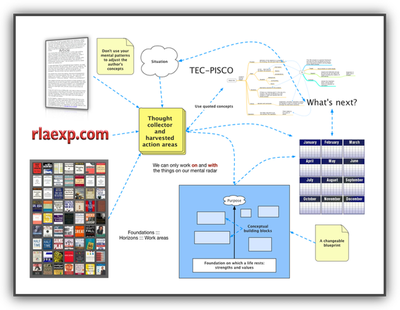
Imagine someone in 1920, 1940, 1960, or … attempting to create a career or work life guide …
“To know something,
to really understand something important,
one must look at it from sixteen different angles.
People are perceptually slow,
and there is no shortcut to understanding;
it takes a great deal of time.” Drucker read more on this
 Thinking — the knowledge worker’s doing Thinking — the knowledge worker’s doing
 The Josh Abrams story — allocating one’s life The Josh Abrams story — allocating one’s life
 Ten Principles for Life II Ten Principles for Life II
 The Wisdom of Peter Drucker The Wisdom of Peter Drucker
 Narrower work life related days from the The Daily Drucker Narrower work life related days from the The Daily Drucker
 Managing Oneself is a REVOLUTION in human affairs Managing Oneself is a REVOLUTION in human affairs
 The Essential Drucker answers the question: “Where does one begin to read Drucker?” The Essential Drucker answers the question: “Where does one begin to read Drucker?”
 What executives should remember What executives should remember
 The Effective Executive The Effective Executive
 Preface Preface
 The World is Full of Options The World is Full of Options
 Life-long learning Life-long learning
 The Post-Capitalist Executive The Post-Capitalist Executive
 Managing in a Post-Capitalist Society Managing in a Post-Capitalist Society
 Two brainroadS: Navigating time and Exploring beyond yesterdayS Two brainroadS: Navigating time and Exploring beyond yesterdayS
 There are over 500 web-pages on this site — only a few of them are linked just above. There are over 500 web-pages on this site — only a few of them are linked just above.

Action system
From exploration to doing
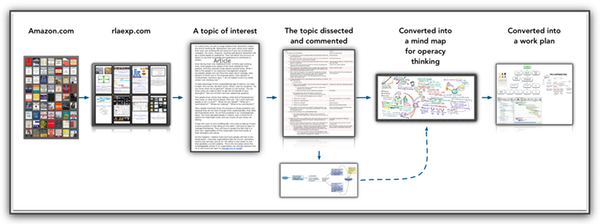
Large view of image above
What do these issues, these challenges mean for …
::: an alternative
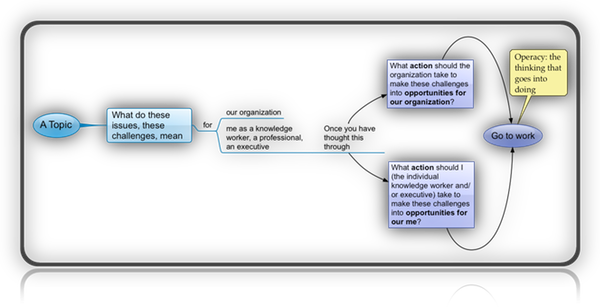
Operacy — the thinking that goes into doing
Thinking canvases
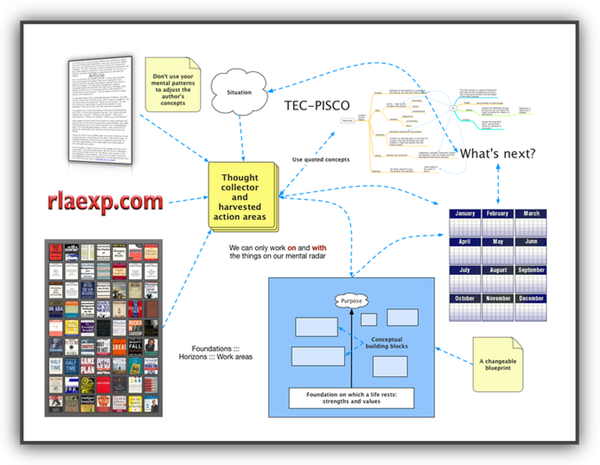
Larger view of the harvesting and implementing image above
Thought collector and time lines
Conceptual resource and action system
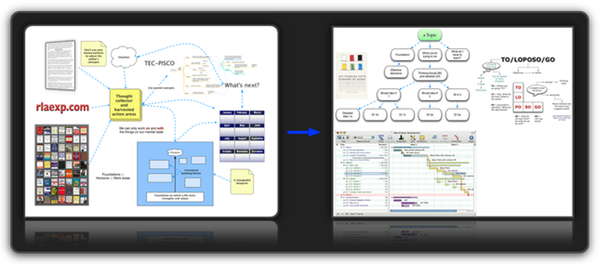
Larger view of the action system image on the right above
The Six Thinking Hats
TO-LO-PO-SO-GO
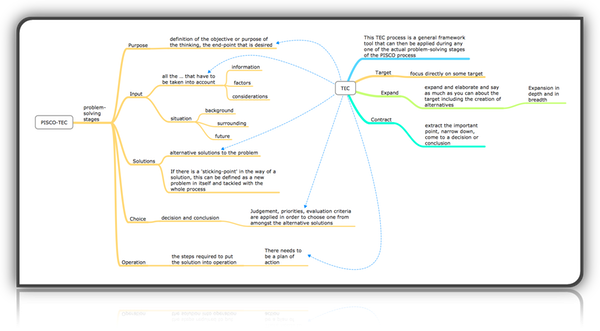
Larger view of the PISCO-TEC image above

|

